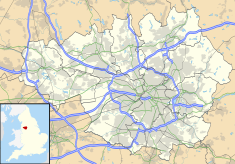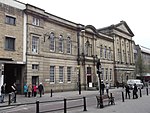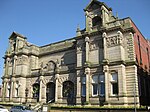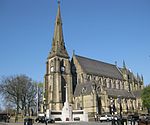Bury Town Hall
| Bury Town Hall | |
|---|---|
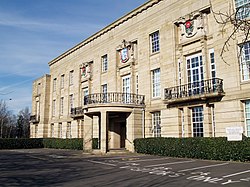 Front view of Bury Town Hall, February 2008 | |
| Location | Knowsley Street, Bury |
| Coordinates | 53°35′25″N 2°18′00″W / 53.5902°N 2.3001°W |
| Built | 1954 |
| Architect | Reginald Edmonds |
| Architectural style(s) | Neo-Georgian style |
Bury Town Hall is a municipal building in Knowsley Street, Bury, Greater Manchester, England. The town hall, which is the headquarters of Metropolitan Borough of Bury, is a locally listed building.[1]
History
Until the mid-20th century, Derby Hall on Market Street accommodated the local council offices, but was no longer fit for purpose.[2] The new building was designed, following an architectural competition, by Reginald Edmonds in the Neo-Georgian style in the 1930s.[3] Construction was delayed by the Second World War and it was only officially opened by Queen Elizabeth II on 22 October 1954.[4][5][6] The design incorporated an assembly hall which became known as the Elizabethan Suite.[7]
The Whitehead Clock Tower, a memorial to Walter Whitehead, a local surgeon, dedicated in June 1914[8] and George Frampton's 'cheering fusilier', a tribute to those soldiers who had died in the Second Boer War, erected in 1920,[9] are both structures which predate the current town hall and stand in Whitehead Garden to the south of the building.[10] The garden itself was a gift from Sidney and Katherine Whitehead of Stormer Hill in Bury to commemorate the lives of seven people who were killed in Chapel Street by a V-1 flying bomb on 24 December 1944 during the Second World War.[11][12]
The town hall was the headquarters of the County Borough of Bury until 1974 when it became the headquarters of the enlarged Metropolitan Borough of Bury.[13] A three-dimensional relief of the enlarged borough's coat of arms, designed by Diana Childs, was installed in the council chamber in the mid-1970s.[14] The Prince of Wales visited the town hall for a lunch meeting with the civic dignitaries on 14 December 1977.[15]
In July 1992 Queen Elizabeth II chose the town hall as her destination on her inaugural journey on the Manchester Metrolink; she had lunch in the building on her arrival.[16][17]
The building had to be closed for weddings and other public events in July 2020 after part of the ceiling on the second floor collapsed.[18]
References
- ^ "Draft local list". Bury Council. Retrieved 24 April 2021.
- ^ "Bury' Met set to re-open after £4.6 million refurbishment". About Manchester. 6 December 2016. Retrieved 8 July 2020.
- ^ "Reginald Edmonds FRIBA". Old Edwardians Gazette. Retrieved 8 July 2020.
- ^ Frain, Sean (2013). The Bury Book of Days. The History Press. ISBN 978-0752485829.
- ^ "Counties And Metropolitan Districts In England". Hansard. 6 July 1972. Retrieved 8 July 2020.
- ^ "Lancashire Only - Queen Continues Lancashire Tour 1954". British Pathe. Retrieved 8 July 2020.
- ^ "About the Elizabethan Suite". Bury Council. Retrieved 8 July 2020.
- ^ Historic England. "Clock Tower, Whitehead or Tower Gardens (1067232)". National Heritage List for England. Retrieved 8 July 2020.
- ^ Historic England. "Lancashire Fusiliers Boer War Memorial (1440258)". National Heritage List for England. Retrieved 8 July 2020.
- ^ Wyke, Terry; Cocks, Harry (2004). Public Sculpture of Greater Manchester. Liverpool University Press. p. 256. ISBN 978-0853235675.
- ^ "The Whitehead Garden". Imperial War Museum. Retrieved 8 July 2020.
- ^ "V1 flying bomb site, Chapel Street, Tottington near Bury". Air Crash Sites. 7 May 2010. Retrieved 8 July 2020.
- ^ "Bury - A brief history". Bury Council. Retrieved 8 July 2020.
- ^ "Death of town arts supporter". Bury Times. 21 September 2007. Retrieved 8 July 2020.
- ^ "December 13-14". The Bolton News. 16 December 2002. Retrieved 8 July 2020.
- ^ "Phase 1 of Metrolink". Transport for Greater Manchester. Retrieved 8 July 2020.
- ^ "Court Circular". The Independent. 18 July 1992. Retrieved 8 July 2020.
- ^ "Bury town hall closed after ceiling collapses - four weddings have had to be relocated". Manchester Evening News. 10 July 2020. Retrieved 20 July 2020.

